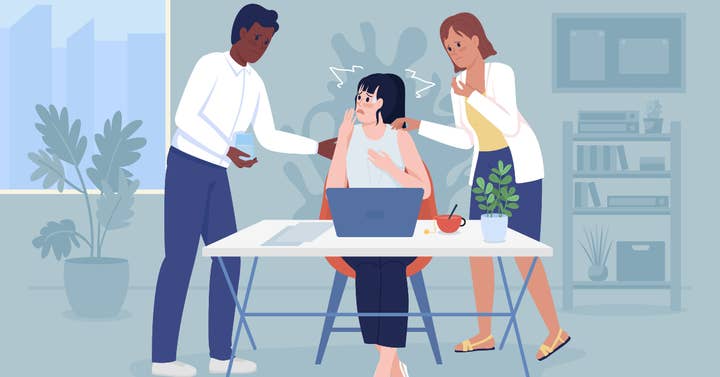Four steps to a mentally healthy workplace
Ripstone's in-house psychology coach, James Marquis, makes the case for a proactive and holistic approach to mental health in the games industry
Sign up for the GI Daily here to get the biggest news straight to your inbox
In recent years, mental health in the games industry has become a major point of discussion. The growing conversation around it has started to destigmatise talking about mental health in the workplace and organisations are now becoming better equipped to help their staff.
Back in May, BAFTA and Safe In Our World held their first-ever Games Mental Health Summit. This was the first time I really noticed the conversation around mental health in games start to move from a reactive approach – one where games companies develop initiatives to help employees after the fact – to a proactive approach, one that looks deeper into the 'why' of the industry's mental health concerns.
Here, I make the case for the industry to adopt that holistic mindset and offer my own steps for game developers to take on their way to becoming truly healthy organisations.
Step #1: Reframe mental health
The games industry needs a wholesale mindset change. Simple, right?
The end goal sounds intimidating, but the place to start is at the ground level; looking in the mirror at our own organisations and making an honest appraisal about how we perceive mental health.
What does this mean in practice? I often hear the phrase 'mental health issues', followed by a discussion about the role studios should play in supporting people that are already experiencing challenges. This limits you to a purely reactive mindset. We need to think about mental health in the same way as physical health.

For example, when people talk about getting fit, about reducing cholesterol, about how many steps they've clocked, they don't do it in hushed, serious tones. They talk about it in terms of getting healthier and happier. Mental health is best thought of and discussed in the same way.
This was enlightening when we did this ourselves at Ripstone, and it acted as a spark for us to take further action. I'm calling on the games industry to reframe the way it thinks and talks about mental health and adjust to embrace a positive, proactive perspective that empowers teams and nurtures healthier and happier individuals.
During the Games Mental Health Summit, fellow panellist Luke Hebblethwaite, BAFTA's head of games, said: "Who do we want making our games? Sad, stressed, pressured, and burned-out people... Or do we want happy, empowered, creatively fulfilled and balanced people?"
Mental health support and first aid will still have its place, but we need to shift our mindset toward building more resilient environments that promote holistic health from the outset. After all, empowered people having fun and leading balanced lives make amazing games.
Step #2: Open up the conversation
Involve everyone.
Each organisation will find its own path, but it's crucial to involve everyone in your company from the offset.
The only way to address things proactively is by creating a safe space in which people can share and openly discuss the challenges you collectively face as an organisation, and then explore potential solutions together.
Surveys can be an effective tool to help to anonymise contributions. We found that making mental health awareness training available to all roles in our organisation was hugely beneficial. This has helped create a common language that has kept the conversation going, long after the training sessions are over.
There's plenty of data to support that [proactive mental health care] is not only needed, but is also good for the bottom line
By engaging the entire team, you'll gain valuable insights into the challenges individuals face and discover common threads to address first. Remember, you don't have to have all the answers right away. Humility is key, and acknowledging that you need input from everyone will foster a sense of ownership and collaboration.
It's important to bear in mind, however, that not everybody will be comfortable with sharing their thoughts – and that's ok too.
You might face some resistance as you start these conversations. So, if you need to convince someone of the value of proactive mental health care, the good news is that there's plenty of data to support that it is not only needed in the games industry, but is also good for the bottom line.
The 2022 UKIE census found that 38% of the people who responded suffered from anxiety, depression or both. This is up from 31% before the COVID-19 pandemic. More generally, Deloitte's "Mental health and employers" report found that, on average, for every £1 invested in mental health support there is a £5.30 return.
The need is evident and the benefits of better mental health care are clear. It's now up to all of us to take action.
Step #3: Customise your approach
Make changes that work for you.
A bedroom indie duo won't have the same resources to implement 'healthy' changes as an international studio, but they also won't have the same needs. So you need to choose your own way forward. There is no one size fits all solution so, as we say at Ripstone, you will need to 'Bruce Lee' it.
Just as Bruce Lee customised his approach by borrowing, adapting, and personalising various martial arts styles, we must all "Bruce Lee" our mental health initiatives.
Explore external resources, such as industry-specific charities like Safe in Our World, to tap into valuable insights and training opportunities. Join their Discord channels and be part of the wider discussions. Implement internal programs like training and counselling sessions, flexible working hours, and adopt policies that prevent 'crunch' and work-related stress.
Smaller studios that are short on time or resources might want to consider external certifications, such at the Be There Certificate. This is free, self-paced mental health awareness training for employees. I'd also recommend looking into an Employee Assistance Programme. These usually provide 24-hour mental health care for your team and often include things like counselling sessions and crisis assistance.
It is within our power to shape the games industry into a space where mental health is prioritised, individuals thrive, and creativity flourishes. By making positive well-being a fundamental pillar of our industry, we not only nurture the talent within us but also create games that fill the world with excitement, joy, and a sense of achievement.
Step #4: Real-world action
Start something! No matter how small.
It's not about fundamental or costly changes, it's more to do with where we focus our attention. Any small mental health initiative in your workspace could be the thing that starts the ball rolling.
At Ripstone, our staff has monthly access to one to one counselling with me, but we also run a lunchtime walking club, as well as weekly 'R Talks'; small fireside chats that act as safe spaces for employees to talk about whatever it is that is big in their lives.
Small changes like these have had a cascading effect on our culture, setting the stage for sustainable shifts in expectations and attitudes. They have become part of who we are and what we do, and it just so happens that they have huge mental health benefits.
A long-term goal to aim for is establishing a culture where it's everybody's responsibility to care about each other and champion positive mental wellbeing. Making leaders and managers accountable for their team's mental health is key to building this. Their success should be measured against this, not simply on their ability to deliver work and hit deadlines.
Positive prevention is an integral step towards creating a game development community that truly and proactively cares for its people
The BAFTA Games Mental Health Summit shows that there is a real groundswell to do things differently and that, with the right focus, we can make a real impact.
We're a young industry, one that has been built on the passion of its people. Let's use this as a superpower to avoid the pitfalls that other industries fall into. Together, we can advocate for an industry that embraces a new proactive approach towards mental health.
Why not start with a small first step?
Try putting something – anything –into action. Encourage your colleagues and managers to talk more; sometimes you might need a time and place to trigger those dialogues. Show compassion for one another's concerns. You may be surprised at how simple conversations can open up the door to healthier ways of working.
Positive prevention will look different for every organisation, but it's an integral step towards creating a game development community that truly and proactively cares for its people.
James Marquis is a psychology coach with over 16 years of experience in mental health and well-being. He recently joined Ripstone as their in-house expert, empowering employees to overcome personal challenges and industry-specific demands.
More GamesIndustry.biz Academy guides to Working in Games
Our guides to working in games cover various perspectives, from hiring to retention, to landing the job of your dream or creating the right company culture:
